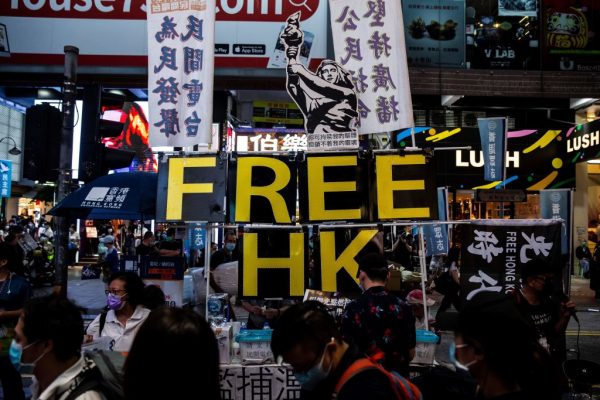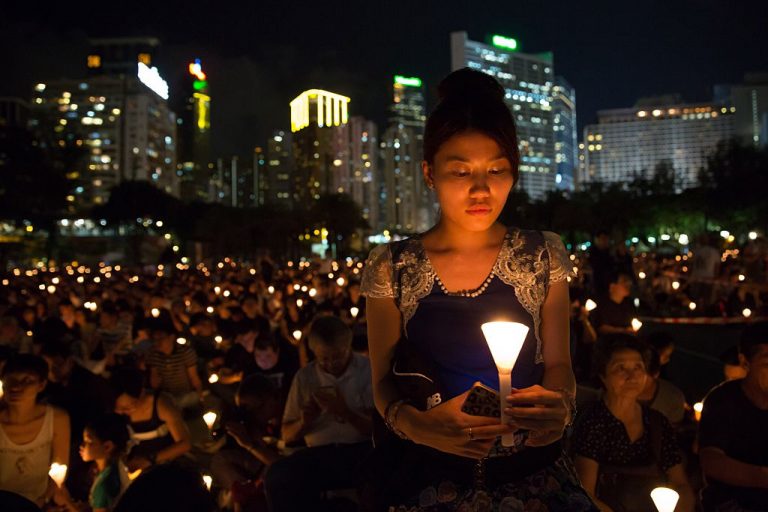Since 1990, tens of thousands of people have gathered in Hong Kong’s iconic Victoria Park to commemorate the hundreds of student protesters who died fighting for democratic rights in Beijing’s Tiannanmen square on June 4, 1989.
The peaceful ceremony has been viewed as a key indicator for the continuation of Hong Kong’s freedoms after the city was handed back to China from British rule in 1997.
RELATED:
- Incoming Hong Kong Leader John Lee Strengthens Xi’s Authority Over City
- Joseph Zen, One of Asia’s Most Senior Catholics, Arrested in Hong Kong on National Security Charges
- Hong Kong, Once a Bastion for Free Press, Now Ranks Dismally in Annual Press Freedoms Report
- COVID-19, Lockdowns Have Many Hongkongers Suffering From PTSD: Study
However, this year’s vigil will likely be banned for a third year running amid an ongoing political crackdown under the ruling Chinese Communist Party (CCP). Previously, authorities had cited public health threats posed by the pandemic as a reason for the event’s cancellation.
But after the controversial and draconian national security law (NSL) was passed, questions are now being asked about the future of the vigil after virus restrictions are loosened, and how the event’s cancellation may signal a growing erosion of Hong Kong’s civil liberties.
In the past two years, the vigil’s leaders and organizing group — the Hong Kong Alliance in Support of the Patriotic Democratic Movements of China — were arrested under charges of “colluding with foreign powers under the national security law.”
Cracking down on Hong Kong’s freedoms
Success
You are now signed up for our newsletter
Success
Check your email to complete sign up
Hong Kong’s far-reaching national security law (NSL) was imposed in June 2020 after months of major pro-democracy protests in 2019 sparked accusations from activists and human rights groups that China was attacking rights and freedoms it previously guaranteed as part of Hong Kong’s handover from Great Britain.
Many have pointed out that Beijing’s enactment of the NSL is a direct contradiction of the 1984 Sino-British Joint Declaration — whereby China promised to guarantee Hong Kong’s civil liberties for at least 50 years after the U.K. returned the city back to Chinese sovereignty on July 1, 1997.
The CCP has responded by labeling all political opposition in Hong Kong as rejecting Chinese sovereignty over the former British colony, with the aim being to break off the city from China. Furthermore, the NSL mandates a maximum of life imprisonment for speaking out against the Chinese regime or other expressions “deemed dangerous.”
Recently, there have also been a growing number of attacks against Hong Kong’s journalists, activists and independent press outlets at the hands of Chinese police.

READ MORE:
- Chinese State-linked Newspaper Brands Hong Kong Journalist Association as ‘Anti-China,’ Calls for Its Disbandment
- After Stand News Arrests, Another Hong Kong Media Outlet Closes Under Chinese Regime Pressure
In December of last year, Stand News, a Hong Kong pro-democracy media outlet was shut down after its office was raided by police and its assets frozen over offenses of “seditious publication” in a round of crackdowns against the city’s media outlets. Since then, several other pro-democracy outlets in the city have also been censored or forced to shut down altogether.
During the raid, police also arrested seven people affiliated with the outlet, including deputy assignment editor Ronson Chan, acting chief editor Patrick Lam, former editor-in-chief Chung Pui-kuen, and former director and chief science editor Chow Tai-chi.
‘Taiwan’s path to democracy was nourished and supported by Hong Kong’
Now, plans are afoot to move the vigil to Taiwan where the event can unfold without disruptions. Taiwan’s New School for Democracy has said it will keep up the vigil’s yearly tradition in support of Hong Kong and all [Chinese people] fighting for democratic rights.
Tseng Chien-yuan, the organizations’ chairman said his group will co-host the vigil in Taiwan on the night of June 3-4.
“Back when I was growing up, I actually used to envy Hong Kong’s freedoms and rule of law,” Tseng said, referencing Taiwan’s peaceful transition from single-party state under the Kuomintang (KMT) — to a pluralistic democracy with a strong human rights record.
“Taiwan’s path to democracy was nourished and supported by Hong Kong, and I think we Taiwanese are duty bound to speak up for Hongkongers and for all Chinese people now that the June 4 event can’t be held there any more,” Tseng said.
‘Candlelight won’t be extinguished’
Hong Kong’s Ming Pao newspaper reported that the city’s Leisure and Cultural Service Department (LCSD), which administers the Victoria Park soccer pitches where the ceremony used to take place, has suspended all bookings for June 4 — the 33rd anniversary of the Tiananmen massacre — although bookings are available on other days of the same month.
Radio Free Asia (RFA) reported that an LDSD official who answered the phone on May 24 said that “non-designated bookings” had been suspended at its sports facilities, and that nobody had tried to hire the soccer pitches between June 1 and 5 of this year.
However, on May 12, the department’s official website released a notice announcing that two of the park’s six soccer pitches will be “closed for maintenance” throughout the months of May and June. The Hong Kong Police also said this week that they had not received applications to hold any large gatherings in the city on June 4.
You Weijie, spokeswoman for the Tiananmen Mothers victims’ group told RFA that she felt it was a great shame that the event wouldn’t be allowed to go ahead as planned, but said people wouldn’t forget the date, nor the three decades of vigils that have already taken place in Hong Kong.
“The candlelight vigil in Victoria Park went on for more than 30 years, and is deeply rooted in the memories of everyone with a conscience,” You said. “It’s part of the desire to live a free life.”
“The candlelight won’t be extinguished; it will just be lit by people of conscience all over the world,” she added.














